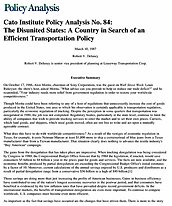On October 17, 1986, Akio Morita, chairman of Sony Corporation, was the guest on Wall Street Week. Louis Rukeyser, the show’s host, asked Morita, “What advice can you provide to help us reduce our trade deficit?” and he responded, “Your industry needs more relief from government regulation in order to restore your worldwide competitiveness.”
Though Morita could have been referring to any of a host of regulations that unnecessarily increase the cost of goods produced in the United States, one area to which his observation is certainly applicable is transportation regulation, particularly the economic regulation of trucking. Despite the perception in some quarters that transportation was deregulated in 1980, the job was not completed. Regulatory bodies, particularly at the state level, continue to limit the ability of companies that wish to provide trucking services to enter the market and to set their own prices. Carriers, which haul goods, and shippers, which need goods moved, often are not free to write and act upon a mutually agreeable contract.
What does this have to do with worldwide competitiveness? As a result of the vestiges of economic regulation in Texas, for example, it costs Neiman-Marcus at least $1,000 more to ship a containerload of blue jeans from a Texas manufacturer than from a Taiwan manufacturer. That situation clearly does nothing to advance the textile industry’s “Buy American” campaign.
The gains from the deregulation that has taken place are impressive. When trucking deregulation was being considered by Congress in 1980, the Congressional Budget Office forecast that by 1984 the legislation, if enacted, would save consumers $5 billion to $8 billion a year in the prices paid for goods and services. The facts are now available, and the economic benefits produced by partial deregulation are exceeding the Congressional Budget Office’s initial estimates by a factor of 10. Moreover, current calculations of the annual savings enjoyed by U.S. producers and distributors as a result of partial deregulation range from a conservative $56 billion to a high of $90 billion.[1]
Those savings are doing more than just increasing the profits of American businesses. Gains in business efficiency have contributed to one of the nation’s longest economic recoveries in the postwar period, and that consumers have benefited is evidenced by the low inflation rates that have prevailed despite record government deficits. In the international markets, the benefits of transportation deregulation are even more important. To continue to compete worldwide, U.S. companies must become even more efficient.
As important as the fact that savings have occurred are the changes that have driven them. There is more to the story than just reduced transportation costs resulting from a more competitive environment. Much of the increased efficiency being experienced in corporate America can be attributed to the improved management of inventory and delivery systems. Costs have been cut dramatically because businesses have been better able to receive raw materials when they are needed and to deliver finished goods to customers when they are demanded. Maintaining inventories of raw materials and finished goods is much more expensive than either policymakers or the general public realize, and additional cost savings could be realized through increased efficiency in this area.
Unfortunately, economic regulation, particularly at the state level, remains a barrier to achieving the greatest savings possible. To demonstrate that the nation’s competitiveness could be enhanced through further deregulation of the transportation industry, this study begins by explaining how the practice of “business logistics,” coupled with partial deregulation, has led to the substantial cost savings experienced since 1980. The rigidities that have been imposed by regulation are then outlined. Finally, it is argued that the economic deregulation of the motor carrier industry should be completed as a major step toward ensuring that U.S. producers regain their international market shares.
About the Author

This work is licensed under a Creative Commons Attribution-NonCommercial-ShareAlike 4.0 International License.
